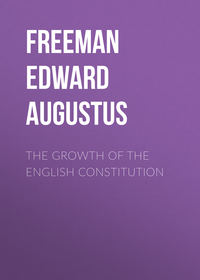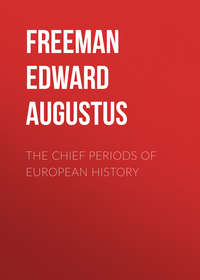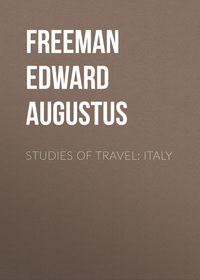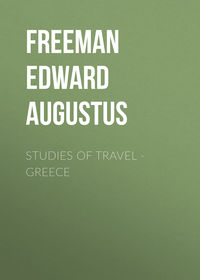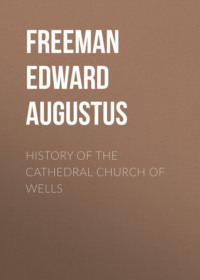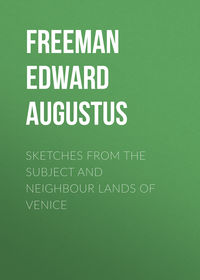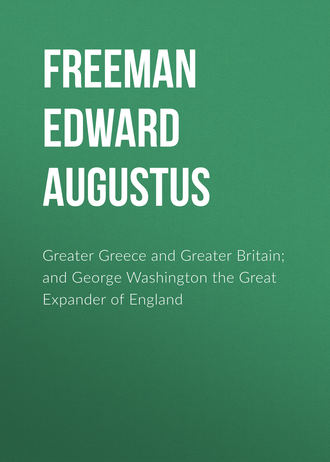 полная версия
полная версияGreater Greece and Greater Britain; and George Washington the Great Expander of England
We have heard a great deal of late about “Imperial Federation.” And the votaries of “Imperial Federation” promise us very wonderful things if the scheme for which they are striving should ever become more than a scheme. Some of the more enthusiastic talkers have told us of the coming union on equal terms of all the English people – it has sometimes even been put, of all the English-speaking people – all over the world. We are not distinctly told whether those who are not English-speaking people are to be shut out from the benefits of the scheme. But the scheme is spoken of as being something specially and intensely English, unless indeed the word “British” is liked better. It is not wonderful that such promises have won over many minds. “Imperial Federation” has a grand sound; it has an air as if it meant something. And if it did mean what it is said to mean, the union, on closer and more brotherly terms, of all men of English descent or of all speakers of the English tongue, it would mean something to the carrying out of which all of us would surely be ready to lend a helping hand. There are however some little points to be thought of on the other side. First, there is the name; then there is the thing. It may be some objection to the name that it is altogether meaningless, or rather that it is a contradiction in terms. It may be some objection to the thing that, whether the results of the scheme should turn out to be good or bad, they could never be the particular results which its votaries, at least its more enthusiastic votaries, tell us that they are aiming at. What is meant might seem to be the closer and more equal political union of all, or a part, of the dominions of the Queen of Great Britain and Ireland. Now that, whether good or bad, possible or impossible, in itself, would be a very different thing from an union of all English-speaking people – and, we must suppose, of none other. It tells a little against the name of the scheme that what is “Imperial” cannot be “Federal,” and that what is “Federal” cannot be “Imperial.” It tells a little against its substance that none can expect the scheme to carry out its professed purpose except those who have forgotten the existence of India and the existence of the United States.
The simple truth is that the phrase “Imperial Federation” is a contradiction in terms, that what is imperial cannot be federal, and that what is federal cannot be imperial. To make out this proposition we must look a little more closely into the history of the words concerned. One of them at least seems to have greatly changed its meaning of late years, and it would be well to know the exact sense in which it is used.
The word “imperial” is the adjective of the substantive “empire.” Now what is meant by “empire”? Speaking as a “pedant,” I cannot help saying that clearness of thought would have greatly gained if the word Empire had always been sternly confined to what was its strict meaning for ages. It would have been well if the name had never been applied to anything but the Roman Empire and those powers which professed to continue the Roman Empire. Or, if it ever went beyond that limit, it would have been well if it had been used only when it was wished to assert an analogy between one of those powers and some other. In this last way it is true and instructive to speak of the Mogul Empire in India, which supplies so many points of analogy with the Empire of Rome; but, after the vague way in which the word is used now, such an application of it would fail to strike many minds as having any special meaning. The word “empire” in truth has taken to itself a quite new use within a very few years past. At no time that I know of would any one have scrupled to speak, in poetical or rhetorical language, of “the British empire,” “this great empire,” and the like. But I can remember the time when no one would have used those phrases, except in language more or less poetical or rhetorical. That is to say, though the speaker may not have consciously thought of suggesting any analogy with the Roman Empire, yet the traditions of the time when those words could not have been used without implying such an analogy had still left their stamp on language. “Empire” was a word somewhat out of the common; it would not have been found in the dry language of an advertisement or in such notices as in those days answered to a telegram. Now the word is used without any special feeling. It seems to have taken its place quite naturally as the highest term in an ascending scale. As the county is greater than the parish, and the kingdom greater than the county, so the empire is greater than the kingdom. The word “empire” is used as one that comes as naturally to the lips as “parish,” “county,” or “kingdom.” This change of language doubtless comes of a change of facts, or at any rate of a change in the way of looking at facts. But it is none the less an abuse of language, and one that has led to not a few confusions.
When Sir James Mackintosh, in his speech on behalf of Peltier, spoke of Napoleon Buonaparte, First Consul of the French Republic, as “master of the mightiest empire that the civilized world ever saw,” it was a rhetorical flourish, and it may be that the thought of Rome was not wholly absent from the speaker’s mind. When, a little later, Napoleon Buonaparte himself bestowed the title of “empire” on his dominions, by no means as a flourish, but as a formal title and a title full of meaning, the thought of Rome was assuredly fully present to his mind. The use of the phrase “British Empire,” as a technical phrase from which all memory of Rome has passed away, is a good deal later than the use of the phrase “French Empire” as a technical phrase from which all memory of Rome had certainly not passed away. In one use indeed the “Empire of Britain” and other phrases of the like kind are very old indeed. They are common in the tenth and eleventh centuries, and they come in again in the sixteenth. They are rare between the eleventh century and the sixteenth, and they go out of use after the sixteenth. That is to say, they were used when there was a reason for using them, and they went out of use when there was no longer a reason. In the earlier period they were meant to assert two things; that the English King was superior lord over all the other princes of Britain, and that the continental Emperor was not superior lord over him. In the sixteenth century, when, under Charles the Fifth, the continental Empire was again threatening, Henry the Eighth found it needful again to assert with no small emphasis that “the Kingdom of England is an Empire.” I made this remark long ago; it has been set forth with increased force and with fresh proofs in the recent work of Mr. Friedmann. In the seventeenth century, when the continental Emperors were no longer threatening, and when the common King of England and Scotland had no need to assert any lordship over himself, such language naturally went out of use, or sank to the level of an occasional survival or an occasional flourish.
From the newest use of the word “empire” and the still newer use of the adjective “imperial,” all memories of this kind have passed away. It is hard to say whether the phrase “Imperial Parliament” was the last use in the old sense or the first use in the new. I suspect that it is not in strictness either the one or the other. It was meant to express the union of three kingdoms into a greater whole; but it was certainly not a protest against any continental empire; nor did it carry with it all the meaning which the word “imperial” has lately taken to itself. And this use of the word is singularly isolated. It is not applied to anything else in the same formal way2; nor is it our custom to apply any adjective in the same way. On the continent adjectives like “Imperial,” “Royal,” “Grand-ducal,” are employed at every moment. The post-office, the police-office, anything else that has to do with any branch of public administration, has the K., the K. K., the R., the I. R. or anything else of the kind, prominently put forward. We do not write up “Royal Post-office,” though we may mark it with the more personal badge of V. R. The reason may be that on the continent we have sometimes to ask whether it is empire, kingdom, or grand-duchy that we are in. Here no man ever doubted about being in the Kingdom of England, the Kingdom of Great Britain, the United Kingdom of Great Britain and Ireland. But there is no reason to think that the phrase “Imperial Parliament,” when it was first used, meant anything more than “Parliament of England, Scotland, and Ireland.” That that Parliament could legislate for any part of the dominions of the King of Great Britain and Ireland no man doubted; but it is not likely that anything beyond Great Britain and Ireland was consciously in the minds of those who devised the title. It is only in quite late times, in times within my own memory, that the word “empire” has come into common use as a set term for something beyond the kingdom. It is only in times later still that the adjective “imperial” has come into common use, in such phrases as “imperial interests,” “imperial purposes.” At the beginning of the present century those phrases would certainly not have been used as quasi-technical terms, though something like them might at any time have been used as a rhetorical figure.
In the present use of the words there is always a latent ambiguity. What is the Empire? The whole of the Queen’s dominions, some one will answer, as distinguished from the mere Kingdom of Great Britain and Ireland. But in what sense is this an Empire? The word is clearly not used in the old sense anywhere but in India. To the title of “Empress of India” there were good objections on other grounds; but it cannot be denied that it accurately expresses the nature of the Queen’s power in India. The Empress of India is Lady over dependent princes and nations in India, just as the “totius Britanniæ Basileus” once was lord over dependent princes and nations in Britain. But this sense does not in the same way apply to the Queen’s dominions in America and Australia; it hardly applies to her dominions in Africa. In what sense do these last form parts of an empire? Is the word meant to imply or to deny any superiority on the part of the seat of empire, that is, on the part of the Kingdom of Great Britain and Ireland? Or is it, by that odd confusion of thought and language which is by no means uncommon, meant somehow to imply that there is such a superiority, but that such superiority ought to exist no longer? As long as the word was a mere figure or flourish, designed simply as a vague name for a great extent of territory, it was needless to ask its strict meaning; it had no strict meaning, and could not mislead anybody. But now that it has become a technical term, we have a right to ask its strict meaning. It adds to the difficulty that we are dealing with an Empire without an Emperor. The Queen is not Empress anywhere but in India; the title may not even be used in the United Kingdom. Otherwise the natural meaning of the phrase “imperial interests” would seem to be the interests of the Emperor, as opposed to any other. It would mean the interests of the imperial power, as opposed to the interests of the states which are dependent on the imperial power. The word as now used seems intended to mean the interests of the whole of the Queen’s dominions, as opposed to the interests of any particular part of them. But this is an odd use of the word “imperial.” We should never speak of “royal interests,” to mean the interests of the whole kingdom, as distinguished from the interests of any particular part of it. “Royal interests,” if the words had any meaning, would mean the special interests of the King. “Imperial interests” would as naturally mean the special interests of the Emperor. Only, as there is no Emperor, it is possible for the word to go about and pick up for itself less obvious meanings.
When then we hear of “Imperial Federation,” we first wish to know the meaning of the word “imperial;” next we wish to know the meaning of the word “federation.” I once defined “a federal government in its perfect form” as “one which forms a single state with regard to other nations, but which consists of many states with regard to its internal government.” And I have seen that definition quoted with approval by advocates of Imperial Federation3. It has been argued that a federation that answers my definition is already formed – perhaps not by the whole of the Queen’s dominions, but by “the United Kingdom, the Dominion of Canada, the different Australian colonies, New Zealand, and the Cape.” From such a list I could not have left out the Kingdom of Man and the Duchy of Normandy – that part of it I mean which clave to its own dukes and remained Norman, when the rest submitted to a foreign king and became French. Nor are we told whether India, Heligoland, Gibraltar, and a few other places, are parts of the federation or not.
Now the singular thing is that some of those who look upon the connexion of the United Kingdom with the other parts of the Queen’s dominions as being already a federal union are fully sensible of the fact which at once shuts out the federal relation. “The United Kingdom,” it has been well put, “keeps to itself, and absorbs within itself, the foreign policy of the whole realm.” The word “realm,” commonly used as equivalent to “kingdom,” seems here to be used as equivalent to “empire,” and the relation here described may be fairly called Imperial. The same fact has been put yet more strongly;
“As regards internal affairs the colonies have self-government. As regards foreign affairs, they are subjects, not merely of the Queen, but of our Parliament – that is of the inhabitants of the United Kingdom, or rather of such of those inhabitants as are voters.”
In a rough practical sense this is true; but that it should be true, even in a rough practical sense, curiously illustrates the conventional nature of our whole system. In theory the whole foreign policy rests in the hands of the Crown. The Queen cannot pass a law or impose a tax without the consent of Parliament; she can declare war or conclude a treaty without asking Parliament about it. But, in a rough practical way, Parliament, and through Parliament the constituencies, can exercise a good deal of influence on foreign policy, though an influence much slighter and much less direct than that which they exercise on domestic policy. But the colonies can exercise no influence at all on foreign affairs; therefore they are not only subjects in the sense in which any man in a monarchy is a “subject” of the Emperor, King, or Grand-duke; they are subjects in the sense of being a society of men which is subject to another society. They are, in short, what a Greek would have called ὑπήκοοι and a Swiss Unterthanen. And, large as their actual powers of self-government are, they are all – unlike the immemorial rights of Man and Jersey – mere grants from the Crown or from the Parliament of the United Kingdom itself. And, though the exercise of the power is in some cases just as unlikely as the exercise of the power of the Crown to refuse assent to a bill that has passed both Houses, still the Parliament of the United Kingdom has never formally given up its right to legislate for any part of the dominions of the sovereign of the United Kingdom.
Practically however the chief British colonies are independent as concerns the internal affairs of each; they are practically dependent or subject only as regards the common policy of the “realm” or “empire.” And it has been said, and that not by an opponent of “Imperial Federation,” that
“These two opposing principles, subordination on the one hand, and self-government on the other – we might almost say subjection and freedom – cannot long co-exist. This imperfect, incomplete, one-sided federation must end either in disintegration or incomplete and equal and perfect federation.”
The only question is whether a federation thus limited is federation at all, and not really subjection. When we speak of “imperfect, incomplete, one-sided federation,” the adjectives destroy the substantive; they show that the relation spoken of is not a federal relation at all. All the elements of a federation are wanting. There is no voluntary union of independent states, keeping some powers to themselves and granting other powers to a central authority of their own creation. There is instead a number of dependent bodies, to which a central authority older than themselves has been graciously pleased to grant certain powers. This state of things is not federation, but subjection. It is perfectly true that an American State, as such, has no more direct voice in the foreign affairs of the American Union than a British colony has in the foreign affairs of the British “empire.” But why? The colony has no such voice, because it is a subject community and never had a voice in such matters. The American State has no such voice, because the direction of foreign affairs is one of the powers which the States have ceded to the Federal authority. But, more than this, not only has the colony no direct voice in ordering foreign affairs, itself and its citizens have no voice, direct or indirect, in choosing those who have the ordering of them. But the American State and its citizens have a direct voice in choosing those who have the ordering of the foreign affairs of the Union. The citizens of the several States, as citizens of the United States, choose the [electors of the] President, by whom foreign affairs are actually ordered. The States themselves in their Legislatures choose the Senators, by whom the acts of the President are approved or annulled. Here are two very different stories; the difference between the position of the American State and the position of the British colony is nothing short of the difference between federation and subjection.
In truth the relation between the United Kingdom and the colonies does not answer my old definition of federation which it has been said to answer. The colonies are not “states” in the sense of that definition. The “states” there spoken of are communities like the cities of Achaia, the cantons of Switzerland, the states of America, sovereign and independent communities, which, while keeping to themselves certain of the attributes of sovereignty, have by their own act ceded certain other of its attributes to a central authority4. The colonies are not states in this sense; instead of having granted any powers to a central authority, they have only such powers as the central authority chose to grant to them. They are not states; they are only municipalities on a great scale. I shall doubtless be told that the colonies can alter their criminal law, their marriage law, and a crowd of other laws, which a municipality at home cannot alter. But why? The colonies can do all these things, simply because Parliament has given them the power to do them; and Parliament can, if it chooses, give the same power to the Common Council of London or to the parish vestry of Little Peddlington.
* * * * *Thus far we have been dealing with a state of things which may very likely be “imperial,” but which is assuredly very far from “federal.” It is a state which – we have good authority for so saying – cannot last very long, but which must soon be exchanged either for disintegration or for federation. The question in truth comes to this; Shall an “empire” break up or shall it be changed into a federation? To speak of changing an imperfect federation into a perfect one gives a false idea of the case. What is really proposed to be done is not to change a lax confederation into a closer one or an imperfect confederation into a perfect one. It is to bring in federation, as a perfectly new thing, where at present there is no federation, but its opposite, subjection. And it is proposed to bring in federation, not only as a perfectly new thing, but under circumstances utterly unlike those under which any of the present or past confederations of the world ever came into being. The proposal that a ruling state – if any one chooses to call it so, an “imperial” state – should come down from its position of empire, and enter into terms of equal confederation with its subject communities, is a very remarkable proposal, and one which has perhaps never before been made in the history of the world. It may therefore be well to take a glimpse at the causes which have led to so unprecedented a proposal and to the unprecedented dilemma of which it forms one horn.
It is this subjection of the colonies to the mother-country which is, as I have fully argued elsewhere, the great point of difference between modern European colonies and those colonies of the elder world which have in other respects so much in common with them. While the relations between metropolis and colony are the brightest facts of Greek or Phœnician political life, in modern times the relations between mother-country and colony have often been among the darkest. The subjection of the colony is, as none see more clearly than some advocates of Imperial Federation, an unnatural thing, at the very least a thing which becomes unnatural as soon as the colony has outgrown its childhood. Then comes the alternative, “disintegration” or federation. That is, Shall the colonies part from the mother-country and become independent, or shall they remain united to the mother-country on some terms other than those of subjection? In the Greek system the alternative could not occur; where the colony was independent from the beginning, there was no room for “disintegration.” And though we are sure that the mother-country, taught by experience, would not now think of trying to keep by force any colony that wished to separate, yet “disintegration” is a process which is perhaps not to be desired in itself. It must be better either never to have been united or never to separate. The separation may be needful, but it must be something of an unpleasant wrench. The Greek system made it needless. Metropolis and colony were all the better friends because the relation of subjection had never existed between them.
But it is the other alternative of federation which we have now to discuss. Is that alternative, the substitution of federation for empire, possible? Let us at least remember that what is proposed is unlike anything that ever happened in the world before. That certainly does not of itself prove that the proposed scheme is either impossible or undesirable; still it is a fact worth bearing in mind. It is always dangerous to imagine a precedent where there is none. A perfectly new scheme should stand forth as a perfectly new scheme, as something which may commend itself by its abstract merits, but which has nothing in the way of experience to recommend it. And such is the scheme of federation between the mother-country and the colonies. No ruling state has ever admitted its subject states into a federal relation5. Ruling states have often admitted subject states to equal privileges with themselves; but the promotion has taken the shape, not of federation but of absorption; that is, subjects were raised to the rank of citizens. Of this Rome is the great example; her citizenship was gradually extended, first to the Italian allies – fruit of their war of independence – and then by slow degrees to the provinces also. Now the people of our colonies need no admission to citizenship. They are already British subjects; the essence of the modern colonial relation is that they remain British subjects. The inhabitants of the colonies, each man by himself, are the equals of the inhabitants of the United Kingdom; this or that colonist may be an elector in the United Kingdom; let him come and live in the United Kingdom and he may become a member of Parliament, a cabinet minister, a peer of the realm. It is only the communities, as communities, that are subject. Now it would be quite possible to unite the mother-country and the colonies in a way that might be called at pleasure the removal of subjection or its aggravation. They might be united as Rome and her Italian allies were united, as Scotland, and Ireland were united to England. They might send members to the Parliament of the United Kingdom in fair proportion to their numbers. They would then have exactly the same control over the general affairs of the kingdom, “realm,” “empire,” whatever it is to be called, which the inhabitants of the United Kingdom have now. And, considering the geography of the case, it may be that, instead of Westminster, some point, some island perhaps, more central for the whole “empire” might be chosen as the place of assembly. But, with such an union as this, the local Legislatures of the colonies must be abolished. The Parliament of the whole “empire” must legislate for the whole “empire.” The colony, in short, must rise or sink to the level of a county. The soil of the colony, the people of the colony, would receive the most perfect equality with the soil and the people of the mother-country. Subjection would be utterly done away with. Canada would be no more subject than York. But a share in the control of the affairs of the whole empire would be bought by the loss of all special control over the affairs of the colony itself. Some might think that such a price would be too dear. Self-government, the kind of self-government which the colonies have hitherto enjoyed, would come to an end. There would be only that lesser self-government which belongs to an English county or borough; the internal affairs of any colony would be legislated for by an assembly in which the members for that colony might be outvoted. Subjection, in short, formally abolished, would practically be made more complete.


